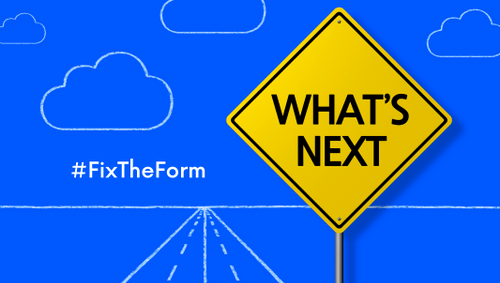
by Roberto Cremonini, SVP, Business Development
When Chantal Forster, executive director of the Technology Association of Grantmakers (TAG), and Kari Aanestad, co-director of Grant Advisor, launched the "100 Forms in 100 Days" campaign as part of the #FixTheForm project, they probably could not have predicted what the collective impact of their campaign would be.
By the 100th day, the response to their outreach had exceeded expectations, reaching more than 3,000 grantmakers and one million NGOs worldwide. In all, 133 forms were contributed by 128 foundations, encompassing more than 6,000 questions.
As a provider of grants management software, we also responded to the call, sharing examples of how features on GivingData can eliminate pain points for grantees. We also provided clients with instructions on how to export their forms so they could join the movement as well.
In a webinar hosted by TAG to discuss the campaign’s outcome, Kwame Porter Robinson, a data scientist at University of Michigan, shared the results of a similarity analysis he conducted on the forms provided. His analysis showed that 39% of questions on grant application forms are alike.
That finding hints at a significant opportunity to reimagine how grant forms can be fixed to work in service of grantees. Here are three main conclusions we took away from the webinar:
- Reducing the number of overlapping questions, or the time required to answer them, could save nonprofits significant time (five hours on average according to Grant Advisor). In GivingData’s Grantee Portal, we address this by allowing applicants to access and reuse information they have shared previously with a funder. We consider this a step in the right direction, but the real time-saver could come from extending data access and reuse across multiple funders.
- A 39% overlap is unlikely to be enough for funders to get on board with a common grant application or application portal. Grantmakers could look instead at the creation of data commons. Standardized data structures would make data shareable and would likely spawn the development of tools that simplify data entry and analysis. NGOs would spend less time answering similar questions on applications, and funders would be able to report and learn from aggregated data sets. A data commons could also mitigate long-standing and as yet unresolved tensions around data ownership and governance.
- We don’t need to boil the ocean to make a difference. The FixTheForm campaign is an example of how we can create high-impact partnerships if we start with clear and simple goals, set aggressive but realistic timelines, and activate a network of diverse stakeholders. Diversity is key here. Invite unusual suspects to the table, such as GMS vendors in this case, and opportunities for innovation and change will flourish.
As the discussion on the TAG webinar chat clearly showed, interest in this movement is only growing, and great ideas will continue to emerge from the grantmaking community.
So, we thought we'd pose the question to you – what should we do next?
We created a very unscientific one-question poll where you can weigh in on this topic. We'd love to know what you think.
And please note our poll is not associated with GrantAdvisor, TAG, or the #FixTheForm project, but we will happily share the results with those organizations to help inform their next steps and build continued momentum.
Sign up for the GivingData Insights Newsletter
Receive actionable insights to streamline your grantmaking processes straight to your inbox.

